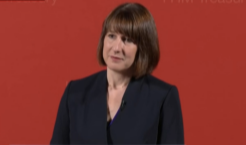
Rachel Reeves warned her Budget on 30 October would be tough as she gave the clearest signal yet that businesses will face an increase in national insurance.
The chancellor stressed that Labour manifesto’s commitment not to increase national insurance contributions (NICs) related to taxes paid by working people – the employee element – rather than the sum paid by employers.
Reeves was speaking to reporters at the government’s International Investment Summit, where deals worth more than £60bn were hailed as a sign that the UK is open for business.
However, the looming tax increases could dampen business enthusiasm for the new government.
Earlier in the day the government’s science secretary Peter Kyle had refused to confirm or deny reports of a potential rise in employers’ NICs.
Kyle told the press that all manifesto commitments would be honoured, and the manifesto “promised there’ll be no new taxes on working people, so there won’t”.
Kyle’s comments followed mounting speculation in relation to employer NICs after business secretary Jonathan Reynolds’ recent comments on Sky News.
Reynolds hinted at a possible increase in the rate paid by employers, suggesting the party’s pledge referred specifically to “taxes on working people”.
Indicating that employer NICs were being looked at, Reeves said: “We were really clear in our manifesto that we weren’t going to increase the key taxes paid by working people: income tax, national insurance and VAT and, on the business side of commitment, that we would cap corporation tax at its current rate of 25% which was the lowest in the in the G7 and we will stick to the commitments we made in our manifesto.
“But you know that there’s a £22bn black hole over and above anything that we knew about going into the election that we need to fill, and that’s not just for one year, but that persists throughout the forecast period.
“The precondition for bringing investment into a country is economic and fiscal stability. So we are going to need to close that gap between what the government is spending and what you’re bringing in through tax receipts.
“I have been really clear that the first of our fiscal rules is that we will pay for day-to-day spending through tax receipts.
“At the moment, we’re not on track to be able to do that by the end of the parliament, because of that black hole, and so decisions will need to be made. But you know, we are going to be a government that sticks to our manifesto commitments, including that one.”
Chris Etherington, partner and head of tax at RSM, said: ‘If the chancellor cannot raise the desired tax receipts from wealthier taxpayers alone and will not raise it directly in higher tax rates for workers, there are few options left to carry the burden of the Budget deficit. NICs may hold the key to unlocking the finances Ms Reeves is looking for.
‘By far the simplest measure that the chancellor could take would be to simply increase the rate of NICs paid by employers by 1%.’
HMRC’s figures estimate that it would raise £8.45bn in the 2024/25 tax year.
‘Whilst it would not strictly represent a tax on “workers”, it would clearly be a tax on “jobs”. The impact of such a rise could indirectly flow through to salaries and stifle growth of companies,’ warned Etherington.
The potential changes to National Insurance and other taxes have sparked intense debate among business leaders, politicians, and economists.
Christy Wilson, tax associate at Katten Muchin Rosenman LLP, commented: “There is speculation that a rise in the rate of employer NICs could be announced during the budget. So far, this speculation has been met with criticism as it is argued that an increase in employer NICs would breach Labour’s manifesto commitments.
“Any increase in employer NICs will add to the overall expenses of businesses. Whilst it is the responsibility of an employer to pay its employer NICs, it is likely that the economic burden of an increase in employer NICs would ultimately be passed on to employees.
“A study conducted by the Institute for Fiscal Studies showed that, in the long term, two out of three employer NIC increases/cuts were shifted onto employee’s wages.”


Comments are closed.